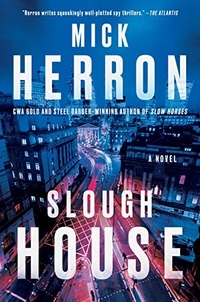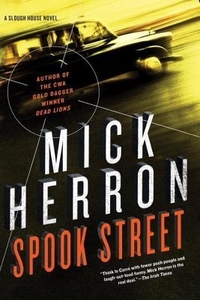Slough House by Mick Herron
 Friday, April 9, 2021 at 6:52AM
Friday, April 9, 2021 at 6:52AM 
Published by Soho Crime on February 9, 2021
Members of a group called the Yellow Vests are making noise about British pride, referring of course to white pride. While Slough House avoids direct mention of Brexit, Mick Herron alludes to it throughout the novel, painting its proponents as chumps and the politicians who endorse it as power hungry chump manipulators.
Peter Judd is one of the manipulators. He’s using Desmond Flint as his stalking horse. Until Judd takes ownership of him, Flint is part of an unruly mob who are trying to “own the libs.” Judd is manipulating Flint into a position of power, a position that Judd plans to control.
Judd believes he also controls Diana Taverner, who occupies the First Desk at the Secret Intelligence Service. Judd and a few other men of wealth bankrolled an off-the-books operation that Taverner directed without the knowledge of her superiors or the Prime Minister. Seeking revenge for a GRU murder of British agents, Taverner commissioned an assassination of her own on Russian soil. The private funding made it possible to do so without seeking permission that never would have been granted.
The GRU, of course, doesn’t appreciate Taverner’s retaliation, so it sends two assassins to England to perform a counterretaliation. To make that mission work, it needs to identify some agents. The GRU has acquired an archived list of agents from a wealthy young media owner named Damien Cantor, who believes that owning a news channel is “like putting a deposit down on a government.” The list is so old that some of the agents are no longer working. All of the agents happen to be assigned to Slough House, where the SIS sends spies who turn out to be useless when it doesn’t kill them instead.
The plot thus parallels current themes in British politics, from rising nationalism and Brexit to media influence and image as a substitute for substance. The plot begins with the murder of former Slough House agents. The killings coincide with a training exercise that irritates Jackson Lamb almost as much as the murders. Lamb is the curator of Slough House and perhaps the most unlikely spy master in the history of spy fiction. Lamb despises his agents (or at least that’s his claim) but he is solidly behind them, following the code of protecting his joes at all cost. When it becomes clear that his joes are being targeted, Jackson doesn’t let Taverner get in the way of doing what he believes should be done. The slow horses at Slough House might not be the best that Britain has to offer, but under Jackson’ guidance, they’re always good enough.
No other series in spy fiction infuses the intrigue of espionage with humor as effectively as the Slough House books. The supporting cast is quirky — Roderick Ho unrealistically regards himself as James Bond; Shirley Dander regularly gets drunk and sleeps around, River Cartwright never quite lives up to the standard set by his legendary grandfather — but they are endearing in their own ways. Rarely does a book go by in which a slow horse doesn’t die and it’s always a bit sad when that happens.
Much of the humor comes from Herron’s keen observation of the world: “When they went on about sixty being the new forty, they forgot to add that that made thirty-something the new twelve.” Herron alternates between dry wit and fart jokes, always achieving a perfect balance of humor and drama. His stories make clear that the world’s evil is not confined to places like Russia and China but is equally embodied in the lust for power that threatens all democracies. Every book in this series is a winner; Slough House is no exception.
RECOMMENDED


